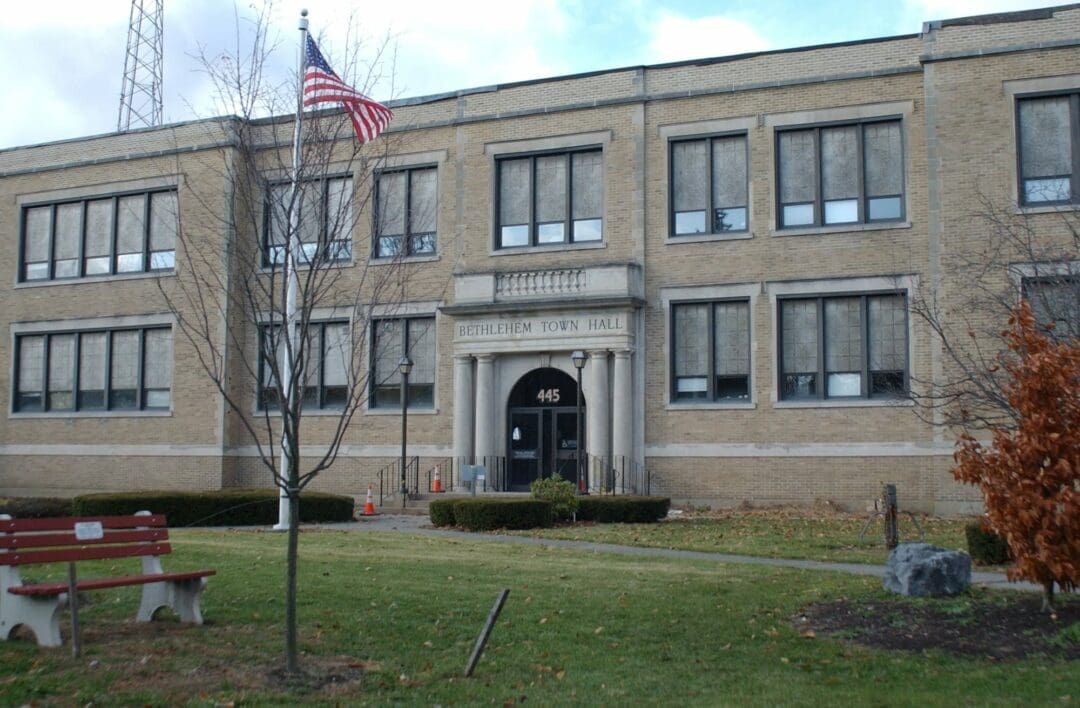DELMAR — The developer of a proposed affordable housing project that has sparked heated discussion throughout Bethlehem received the waiver it sought to continue its plan through the Town’s review process despite the moratorium that has stalled it.
The waiver was approved by a 3-1 vote of the five-person board on Wednesday, Dec. 8; Town Supervisor David VanLuven abstained from voting. NRP Group is now expected to appear before the town Planning Board when it meets on Tuesday, Dec. 21.
The Cleveland-based developer resubmitted a waiver request for its 72-unit Selkirk Reserve development, a proposed affordable housing project last deliberated in May. It returned to the Town Board this month to resubmit its request in order to save state funding it was awarded prior to the moratorium. The group had secured funding from New York state Homes and Community Renewal contingent on plan approval.
Town Board members cited the potential for lost funding as a hardship brought on by its 12-month moratorium. Prior to approving the waiver, the Town Board extended the embargo on residential development by another six months with a 4-1 vote.
Before the moratorium, NRP Group had applied for state funding. In April 2020, it secured $3.4 million in a housing trust fund and was awarded nearly $1.4 million in low-income housing tax credits from the state Housing Trust Fund Corporation. The company itself had invested more than $800,000 into the proposal by December 2019 according to an affidavit signed by the developer’s senior vice president, Christopher Dirr.
“My understanding is that the funding will go away and the project will be killed if we do not grant the waiver,” said Town Board member Dan Coffey. “That changes the dynamic from the last time the developer came to us. … I’m hesitant to allow a project of this size to go forward when the zoning rules may change; however, I’m swayed by the fact that it appears the project will not exist at all.”
The need for affordable housing was identified in a report the town commissioned in 2019. In the report, the Capital District Regional Planning Commission stated how the average county resident would find it difficult to purchase or rent property in Bethlehem. The town was identified as a housing opportunity area by the state Office of Homes and Community Renewal due to its high-performing school districts and as an area experiencing economic growth.
Public opinion of the project was mixed when residents shared their concerns earlier in the year. Those who spoke out in May often prefaced their opposition to the project by acknowledging the need for affordable housing in town. However, they all pointed to several factors to which they felt the particular proposal appeared inadequate — lack of public transportation, no walkability, and its distance away from grocery stores.
Town Attorney James Potter reminded Town Board members that hardship is a “significant component” to its decision, he advised they are not “divorcing” themselves from considering the health, safety or welfare of the Town.
The proposed site will reside within the Ravena Coeymans Selkirk school district, whose schools opponents say are already challenged by providing services for low-income families. Those arguing against the project say there’s more need for socioeconomic diversity in Slingerlands or Delmar than in Selkirk.
According to the U.S. Census Bureau, the poverty rate in the Tri-City region is 10.2 percent, and 14.1 percent in the state. Of the 7,870 people who live in Slingerlands, 3.6 percent fall under the poverty line. The same rate in Delmar (population 16,940) is 5 percent, while Selkirk (6,945) has a poverty rate of 9.8 percent.
Town Board members prefaced their vote by explaining to the audience that their decision was based only on the waiver request and how the moratorium affected the developer and its project. They added that their concerns over the perceived merits and inadequacies of its proposal would be weighed by the Planning Board.
“Many of the questions that have been raised are exactly the kind of questions through the planning board review process,” said Town Supervisor David VanLuven. “The only reason the Town Board is even discussing this is because of the moratorium. …
“People have asked, what’s different between May and now?” added VanLuven, adding how he and state legislators convinced HCR in May to retain its funding through the original end of the moratorium this month. Once the Town started to talk of a six-month extension, he said, “They told me under no uncertain terms that they were not going to continue the funding for the project. … So that’s what’s different.”



